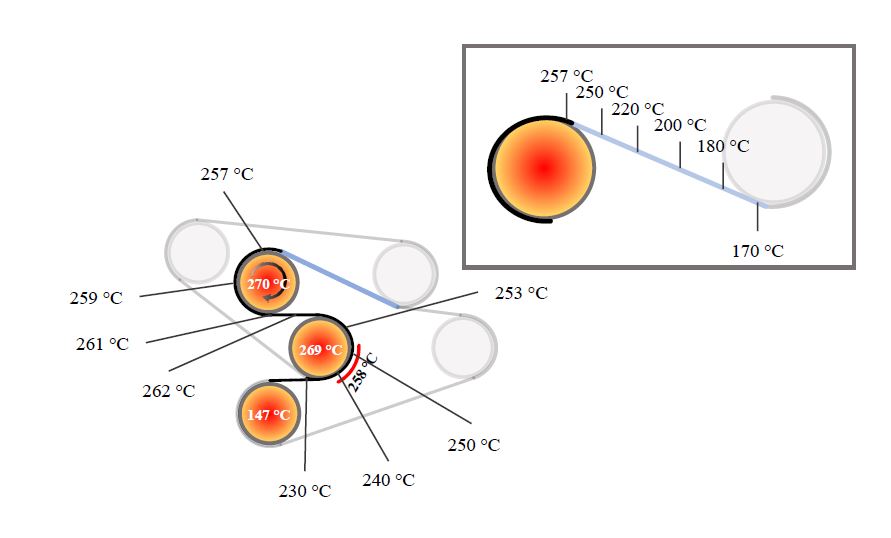Calender direct impregnation of assembled textile reinforcement structures


The further development of the calendering process forms the solution for the continuous and large-scale impregnation of textile structures, as well as the consolidation of pre-impregnated semi-finished fiber matrix products for the production of thermoplastic semi-finished products. The current research focus is the analysis and optimization of the impregnation of various dry textiles with different matrix systems.
The use of thermoplastic semi-finished products with long or continuous fiber reinforcement enables high degrees of lightweight construction, a high degree of flexibility and good mechanical properties to be achieved with efficient processability.
The impregnation of textiles (fabrics, scrims) with thermoplastic matrix systems requires optimal process control due to the higher viscosity of the melted thermoplastics, in contrast to low-viscosity thermosetting reactive resins.
The new direct calender impregnation system of the Fraunhofer project center in the Open Hybrid LabFactory in Wolfsburg enables the continuous impregnation and consolidation of roll-shaped input materials (dry textiles, hybrid textiles, pre-impregnated semi-finished fiber matrix, thermoplastic matrix systems) under the influence of pressure and temperature. The matrix system will be fed to the process in the form of a film or fleece.
The project includes the analysis of the impregnation of glass fiber fabrics and fabrics with polypropylene (PP) and polyamide 6- (PA6) matrix film, the impregnation of flax fiber-polymer fiber hybrid fabrics and the consolidation of hybrid nonwovens made of short glass fibers and polymer matrix (PP, PA6 ) which are examined in parameter studies. The decisive parameters of the direct calender impregnation plant, which affect the quality of the products, are temperature, surface pressure between the steel belts of the plant and the impregnation- and cooling-time, which is largely determined by the belt speed of the plant. The quality of the materials is determined by mechanical parameters and an optical assessment of the degree of impregnation using micrographs.
When processing glass fiber fabrics and fabrics with PP and PA6 matrix systems, thermoplastic semi-finished fiber products with good mechanical properties could be produced. Three layers of a 390 g / m² glass filament fabric with twill weave and a 573 g / m² 󠇯 ± 45 ° biaxial scrim were used as reinforcement textiles. With a fiber volume fraction of approx. 43%, tensile strengths of up to 410 MPa were achieved with an elastic modulus of 20 GPa.
The current research focus is the further development and optimization of the steel strip coating or treatment for an optimal separation of the product at the end of the impregnation or consolidation process.
 Fraunhofer Project Center Wolfsburg
Fraunhofer Project Center Wolfsburg